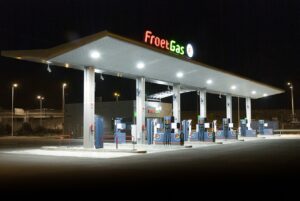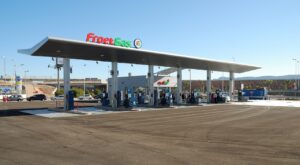
Running a gas station presents unique challenges, particularly in financing. Whether aiming to expand an existing station, upgrade facilities, or launch a new venture, securing adequate funding is essential. Gas station financing provides specialized financial solutions tailored to the industry’s requirements.
This detailed guide explores all aspects of gas station financing, from identifying various loan options to navigating the application process. By the end, you’ll know to make informed decisions and advance your gas station business.
Overview of Gas Station Loans
So, you’re in the fuel business and eyeing expansion, or just need some financial octane to revamp your current station. Gas station loans could be the turbo boost you’re looking for.
Types of Gas Station Loans
- SBA 7(a) Loans: These government-backed loans are like premium fuel for small businesses, offering low rates and extended terms.
- Commercial Real Estate Loans: Need to buy or refuel property? These loans are your pit stop for acquiring or renovating gas station real estate.
- Equipment Financing: From pumps to tanks, equipment financing ensures you’re running with the latest tech and reliability.
- Inventory Financing: Keeping your shelves stocked? This loan helps manage your cash flow by covering fuel and retail inventory needs.
Why Gas Station Loans Matter
Think of these loans as the fuel injector for your growth engine. Whether upgrading pumps for faster fills or expanding your convenience store offerings, having the right financing strategy can keep your business cruising ahead.
Key Considerations
- Credit Scores: Like checking your oil, lenders will gauge your creditworthiness. Higher scores often mean smoother approvals and better rates.
- Collateral Requirements: Lenders may want to see some collateral—maybe the station itself or other business assets—as security.
- Interest Rates and Terms: Like fuel prices, loan rates can vary.
Applying for a Gas Station Loan
Buckle up for the application process—it’s where the rubber meets the road. Prepare to show your business plan, financial statements, and projections to demonstrate your station’s profitability and growth potential.
Types of Gas Station Loans
When financing your gas station, clearly understanding the types of loans available can make all the difference. Here’s a breakdown of the main types of gas station loans, each designed to cater to different needs and stages of your business:
- SBA 7(a) Loans
Overview: These loans are like premium fuel for small businesses, offering low rates and extended terms backed by the Small Business Administration (SBA).
Key Features:
- Loan Amount: Up to $5 million
- Interest Rates: Competitive rates, often lower than conventional loans
- Term: Up to 25 years for real estate, generally shorter for working capital
- Use: Purchase or refinance of real estate, equipment, working capital needs
- Commercial Real Estate Loans
Overview: Do you need to acquire or refuel your gas station property? These loans are tailored to purchasing or renovating real estate.
Key Features:
- Loan Amount: Based on property value and financial strength
- Interest Rates: Variable, typically tied to prime rate
- Term: Up to 25 years
- Use: Acquiring or renovating gas station property
- Equipment Financing
Overview: Keep your station running smoothly with financing for equipment upgrades and replacements.
Key Features:
- Loan Amount: Based on equipment value
- Interest Rates: Fixed or variable rates
- Term: Typically matches equipment lifespan
- Use: Upgrading fuel pumps, tanks, convenience store equipment
- Inventory Financing
Overview: Ensure your shelves are stocked, and pumps are flowing with financing tailored for inventory needs.
Key Features:
- Loan Amount: Based on inventory value
- Interest Rates: Variable, tied to inventory turnover
- Term: Short-term, revolving credit lines
- Use: Purchasing fuel inventory, convenience store goods
Choosing the Right Loan
Selecting the best loan for your gas station depends on your goals and financial situation. When making your decision, consider factors like loan amount, interest rates, repayment terms, and eligibility requirements.
Table: Comparison of Gas Station Loan Types
| Loan Type | Loan Amount | Interest Rates | Terms | Use |
| SBA 7(a) Loans | Up to $5 million | Competitive, fixed, or variable | Up to 25 years | Real estate, equipment, working capital |
| Commercial Real Estate | Based on property value | Variable, tied to prime rate | Up to 25 years | Acquiring or renovating property |
| Equipment Financing | Based on equipment value | Fixed or variable rates | Matches equipment lifespan | Upgrading station equipment |
| Inventory Financing | Based on inventory value | Variable, tied to inventory turnover | Short-term, revolving credit lines | Purchasing inventory, operational needs |
Key Considerations When Applying for Gas Station Loans
Navigating the application process for gas station loans requires careful consideration of several vital factors. Here’s a concise list to guide you through the preparation and application stages:
- Business Plan Preparation:
- Craft a detailed business plan outlining your current operations, future goals, and how the loan will facilitate growth. Highlight your station’s profitability and market position.
- Financial Statements:
- Gather up-to-date financial statements, including income statements, balance sheets, and cash flow projections. These documents demonstrate your station’s economic health and repayment capability.
- Creditworthiness Assessment:
- Check your personal and business credit scores.
- Collateral Evaluation:
- Identify potential collateral options, such as your gas station property, equipment, or other assets.
- Loan Amount and Terms:
- Calculate the necessary funds and the repayment schedule that matches your cash flow and revenue forecasts. Evaluate different loan choices to discover the ideal match for your financial plan.
- Lender Selection:
- Research and compare lenders specializing in gas station financing. Consider their experience in the industry, interest rates, fees, and customer service reputation.
- Documentation Preparation:
- Ensure all required documentation is complete and organized. This typically includes tax returns, business licenses, legal documents, and personal identification.
- Application Submission:
- Be prepared for potential follow-up questions or requests for additional information from the lender.
- Review and Negotiation:
- Review loan offers carefully, paying attention to interest rates, repayment schedules, and associated fees. Feel free to negotiate terms to ensure they align with your business objectives.
- Approval and Funding:
- Upon approval, review the loan agreement in detail before signing. Once signed, funds are typically disbursed to your account to fuel your business plans.
Step-by-Step Process of Applying for Gas Station Loans
Securing a gas station loan involves steps from preparation to funding. Here’s how to navigate the process with confidence:
- Preparation Stage
Before diving into the loan application, thorough preparation is critical to presenting a compelling case to lenders:
- Assess Financial Health: This helps determine your borrowing capacity and repayment ability.
- Credit Check: Evaluate both personal and business credit scores. A strong credit history enhances your credibility and improves loan terms.
- Business Plan: Develop a comprehensive business plan outlining your station’s current operations, growth strategy, and how the loan will support these objectives. Include market analysis, competitive landscape, and revenue projections to showcase your station’s potential.
- Research and Comparison
- Explore Loan Options: Research lenders specializing in gas station financing. Compare interest rates, loan terms, fees, and customer reviews to find a lender aligned with your needs.
- Types of Loans: Based on your specific requirements, consider SBA 7(a) loans, commercial real estate loans, equipment financing, and inventory financing.
- Application Submission
Once prepared, proceed with the loan application process:
- Gather Documentation: Collect necessary documents such as tax returns, business licenses, personal identification, and legal documents.
- Complete Application Form: Please ensure the loan application form is completed thoroughly, including precise details about your employment, financial situation, and specific loan needs.
- Review and Approval
- Loan Review: The lender evaluates your application, analyzing financial documents, credit history, and business plan. Be prepared for inquiries or requests for additional information.
- Negotiation: Review loan offers carefully, including interest rates, repayment terms, and fees. If necessary, negotiate terms to align with your financial goals.
- Closing and Funding
- Loan Agreement: Upon approval, review the loan agreement thoroughly.
- Funding Disbursement: Funds are typically disbursed directly to your account after signing. Use these funds to implement your business expansion or operational improvements.
- Post-Funding Management
- Monitoring: Regularly monitor your station’s financial performance and adhere to repayment schedules to maintain a positive relationship with the lender.
- Adaptation: Adjust business strategies based on market conditions and operational requirements to ensure loan repayment and business success.
Frequently Asked Questions (FAQs) About Gas Station Loans
What are the typical loan amounts available for gas stations?
Gas station loans can range widely depending on the lender and your specific needs. For example, SBA 7(a) loans can go up to $5 million, while commercial real estate loans may be based on property value.
What are the interest rates like for gas station loans?
Interest rates for gas station loans vary based on factors like the type of loan, lender, and market conditions. SBA loans typically offer competitive rates, while commercial loans may have variable rates tied to prime rate fluctuations.
Do I need collateral to secure a gas station loan?
C Generally, lenders may require collateral such as your gas station property, equipment, or other business assets to secure the loan.
How long does the loan application process typically take?
The timeline for loan approval can vary. It depends on factors like the completeness of your application, the lender’s processing times, and the complexity of the loan.
What are the eligibility requirements for gas station loans?
Eligibility criteria vary among lenders and loan types. Typical requirements include a solid credit history, financial stability, a well-developed business plan, and collateral for security.
Can I use a gas station loan for purposes other than expansion or property acquisition?
Gas station loans can be used for various purposes, including equipment upgrades, inventory financing, working capital needs, and even refinancing existing debt to improve cash flow.
What happens if I default on a gas station loan?
Failing to meet loan obligations can lead to significant repercussions, such as harming your credit rating, possible forfeiture of collateral, and legal proceedings initiated by the lender. When experiencing financial challenges, engaging with your lender and exploring alternative solutions is essential.
Are there any government programs or incentives available for gas station loans?
Yes, the Small Business Administration (SBA) offers loan guarantee programs like the SBA 7(a) loan. These programs provide backing to lenders and reduce risk, making it easier for small businesses, including gas stations, to obtain financing.
Conclusion: Navigating Gas Station Loans with Confidence
Navigating the realm of fuel station financing demands strategic foresight, meticulous investigation, and a profound grasp of your business objectives. Whether aiming to expand operations, upgrade equipment, or optimize cash flow, securing suitable funding is pivotal for accelerating business growth.
This guide delves into the complexities of fuel station financing, from exploring various options such as SBA 7(a) loans, commercial real estate financing, equipment leases, and inventory financing to outlining the application process and critical considerations. Each financing option boasts distinct benefits tailored to cater to specific requirements within the fuel station sector.
By crafting a robust business blueprint, compiling essential paperwork, and comparing financing alternatives, you position yourself for success in acquiring funding that aligns perfectly with your station’s needs. Collaborating with experienced lenders and financial advisors can offer invaluable insights and guidance throughout the loan application journey.
Moving forward, staying attuned to market dynamics, adjusting strategies as necessary, and maintaining transparent communication with your lender are essential for ensuring a seamless repayment experience. With diligent planning and well-informed decisions, you can harness fuel station financing to boost profitability, streamline operations, and propel your business toward sustained prosperity.

